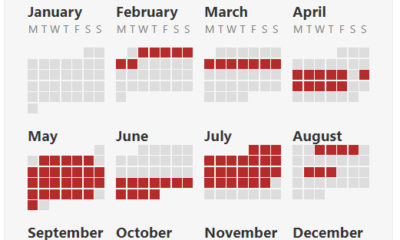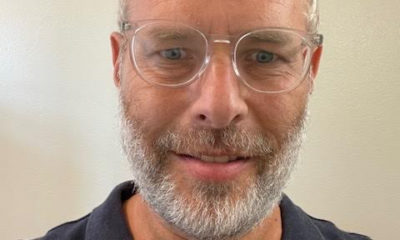
OpEds

SA dangerous place for whistle blowers as De Ruyter case shows
André de Ruyter turned from chief executive to official whistle blower the minute he sat down with broadcaster Annika Larsen and recorded that interview.
He laid bare the extent of corruption at the power utility, the degree of political involvement, and the sheer failure by law enforcement agencies and other authorities to hold extraction syndicates and criminal networks to account. He also divulged the details of the attempt made on his life, and attempts to follow and intimidate him.
De Ruyter’s candid, bombshell-like account of the situation at Eskom also expedited his departure from the parastatal. Within 24 hours of the broadcast, the Eskom board had met and resolved that he should leave his position with immediate effect.
Although De Ruyter has long been a polarising figure with some arguing that he has been a failure as chief executive and simply didn’t manage to fix load shedding, he quickly became the target of very vociferous personal attacks. De Ruyter found out what it’s truly like to be a whistle blower in South Africa.
This is the modus operandi of the accused and the implicated. Don’t answer the allegations. Rather go on the offensive and attack the credibility of the accuser. And the attacks were venomous and vicious.
The African National Congress (ANC) was one of the main targets implicated by De Ruyter as he suggested that the party was using Eskom as a feeding trough. ANC Secretary-General Fikile Mbalula spearheaded the attack on De Ruyter’s credibility. He labelled him “right-wing”, a “failure”, and a “naysayer”. Minister in the Presidency Mondli Gungubele also attacked the former chief executive, saying he had “a right-wing attitude”. Public Enterprises Minister Pravin Gordhan was furious, and said he was “disappointed” by De Ruyter’s comments. The ANC has threatened to file criminal charges against him if he doesn’t report his allegations to law enforcement and back them up with evidence.
This is the lived reality of whistle blowers in South Africa. They are ostracised, intimidated, and vilified. Many of them are dragged through the courts for years and bled dry by endless litigation. They are seen as problematic and difficult. Many are pushed to the fringes of society, and treated as impimpis or troublemakers. Whistle blowers, on their own admission, land up with mental-health problems, their marriages fall apart, and they develop dependencies. They are seen as unemployable.
In spite of South Africa enjoying something of a golden age of whistle blowers with so many individuals speaking up about state capture at the Zondo Commission, there’s still very little support and protection in the country for those who decide to expose corruption. In the worst-case scenario, whistle blowers like Babita Deokaran are killed for pushing back against the rot. In the case of Athol Williams, he had to flee the country for his safety.
The legislation in the country is ineffectual. There’s no physical protection or legal or psychological support. In short, South Africa remains a dangerous place for those who choose to blow the whistle.
Following recommendations in the Zondo Report, the justice ministry has begun the process of reviewing the legislation. Research is being done into global best practice. A draft discussion document will be finalised by April this year, and it is hoped that a new Bill will be introduced by October.
But for now, De Ruyter, like so many other whistle blowers, remains vulnerable. Although he has received some support in the wake of the resounding attacks on his credibility.
Business Unity South Africa and Business Leadership South Africa released a joint statement saying that they condemned the attacks irrespective of which quarter they came from.
“Reactions like these add credence to accusations that whistle blowers are often treated as the criminals they unmask. We will not comment on reactions from political parties but urge the government to act responsibly and give our country the confidence that it will address the allegations speedily and responsibly,” they said.
Energy expert Chris Yelland believes the interview was an act of whistle blowing and De Ruyter’s turning to the media was necessitated by the failure of conventional channels.
“He spoke truth to power, and power doesn’t like it. And he’s been forced out. Now, some might say that that interview was an outrageous political act. I believe a citizen and business leader has a duty and obligation to serve the public interest and to – when necessary – blow the whistle.”
The ANC Veterans League even called on the president to give him whistle-blower protection. The Whistleblower House Director Cynthia Stimpel, herself a whistle blower at South African Airways, urged De Ruyter to take precautionary steps because he could be at risk.
Trillian whistle blower Bianca Goodson, who wrote an open letter to De Ruyter in 2020 asking him to acknowledge her efforts to help Eskom recover funds lost through state capture, also expressed her support and concern in a voice note she sent to the radio show I’m on.
“As a whistle blower, it’s heartbreaking to see what’s happening to André De Ruyter. He did exactly what I did. He basically spoke up about something that he was concerned about and now he’s effectively being made a pariah. In my opinion, we need more people like this. What’s happening now is so concerning. My heart goes out to him because I can see what’s happening to him is on a grander scale than what happened to me. I just wonder as a whistle blower, who is going to support him? Who is going to take on the legal challenges he may or may not face? Who is going to give him a job? Can you blame people for not speaking up when they get annihilated for doing the right thing?” asked Goodson.
De Ruyter may have failed as chief executive of Eskom. We remain deep within the worst extended period of load shedding the country has ever experienced. He was clearly not the panacea to the country’s energy crisis.
But he was also facing a near impossible task. Years of mismanagement, poor maintenance, a reliance on coal, and failure to advance the plan to move to renewable energy, all contributed to the current situation. This has been compounded by deeply entrenched criminal networks and the looting of power-station infrastructure.
Minister of Mineral Resources and Energy Gwede Mantashe disparagingly called De Ruyter a “policeman” for trying to expose the criminal networks feeding off Eskom. He then went so far as to accuse Eskom of treason.
De Ruyter’s public outing of the cabinet and its failure to act was absolutely necessary and an act of patriotism. It was probably fuelled by sheer frustration and desperation and was mistimed, but it did require courage.
The only way we’re going to win the fight against corruption is if those with inside knowledge, with proximity to wrongdoing, speak out in the way that De Ruyter did. We need whistle blowers to raise the alarm. We have to protect and reward them if others are going to do so in the future.
- Mandy Wiener is a journalist and author. She hosts The Midday Report on 702 and Cape Talk. Her recent book, The Whistleblowers, will be republished in April this year.











yitzchak
March 6, 2023 at 8:42 am
Mr de Ruyter had no chance of restoring Eskom having inherited such a litany of fraud and I wonder why he was given the job in the first place to cover up for the misdemeanors of the past.Corruption hides behind the apron strings of transformation.
But he was hated for what he is : a white Afrikaner ,but upright and profoundly honest.But he was no fall guy.
He needs to keep his head down.
and why has his alleged poisoner not been arraigned yet?
aloota continua.